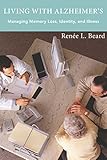Living with Alzheimer's : managing memory loss, identity, and illness / Renée L. Beard.
Material type: TextPublisher: New York : New York University Press, [2016]Description: xi, 324 pages ; 23 cmContent type: text Media type: unmediated Carrier type: volumeISBN: 9781479800117 (cl : alk. paper); 1479800112 (cl : alk. paper); 9781479889808 (pb : alk. paper); 1479889806 (pb : alk. paper)Subject(s): Alzheimer's disease | Alzheimer's disease -- Patients -- Care | Alzheimer Disease -- therapy | Disease Management | Alzheimer's disease | Alzheimer's disease -- Patients | SOCIAL SCIENCE / Gerontology | SOCIAL SCIENCE / SociologyAdditional physical formats: Online version:: Living with Alzheimer's.DDC classification: 616.8/31 LOC classification: RC523 | .B396 2016Other classification: 110
TextPublisher: New York : New York University Press, [2016]Description: xi, 324 pages ; 23 cmContent type: text Media type: unmediated Carrier type: volumeISBN: 9781479800117 (cl : alk. paper); 1479800112 (cl : alk. paper); 9781479889808 (pb : alk. paper); 1479889806 (pb : alk. paper)Subject(s): Alzheimer's disease | Alzheimer's disease -- Patients -- Care | Alzheimer Disease -- therapy | Disease Management | Alzheimer's disease | Alzheimer's disease -- Patients | SOCIAL SCIENCE / Gerontology | SOCIAL SCIENCE / SociologyAdditional physical formats: Online version:: Living with Alzheimer's.DDC classification: 616.8/31 LOC classification: RC523 | .B396 2016Other classification: 110 | Item type | Current library | Call number | Copy number | Status | Notes | Date due | Barcode |
|---|---|---|---|---|---|---|---|
 Books
Books
|
Female Library | RC523 .B396 2016 (Browse shelf (Opens below)) | 1 | Available | STACKS | 51952000329787 | |
 Books
Books
|
Main Library | RC523 .B396 2016 (Browse shelf (Opens below)) | 1 | Available | STACKS | 51952000329756 |
Browsing Female Library shelves Close shelf browser

|

|

|

|

|

|

|
||
| RC 488 .A3 .F75 1997 ممارسة العلاج الجمعي : المرشد للإخصائي النفسي / | RC489.M53 .M3748 2016 The mind-gut connection : how the hidden conversation within our bodies impacts our mood, our choices, and our overall health / | RC489.R46 .H36 2014 Handbook of psychotherapy and religious diversity | RC523 .B396 2016 Living with Alzheimer's : managing memory loss, identity, and illness / | RC531 .L344 2015 Anxious : the modern mind in the age of anxiety / | RC533 .O2645 2014 Obsessive-compulsive disorder and its spectrum : a life-span approach / | RC535 .P52 2015 Phobias : the psychology of irrational fear / |
Includes bibliographical references and index.
Prologue: Lost in translation -- The meaning of memory loss: illness, identity, and biography -- History and technoscience: from senility to Alzheimer's -- Constructing facts in clinical practice: interpreting, diagnosing, and treating memory loss -- Being cognitively evaluated: learning to medicalize forgetfulness -- Hearing "the A word": the road to becoming an Alzheimer's patient -- Everyday life with diagnosis: the new normal -- Advocating Alzheimer's: biomedical structures and social movements -- Forget me not: the future of Alzheimer's.
News of Alzheimer's disease is constantly in the headlines. Every day we hear heart-wrenching stories of people caring for a loved one who has become a shell of their former self, of projections about rising incidence rates, and of cures that are just around the corner. However, we don't see or hear from the people who actually have the disease. In Living with Alzheimer's, Renée L. Beard argues that the exclusively negative portrayals of Alzheimer's are grossly inaccurate. To understand what life with memory loss is really like, Beard draws on intensive observations of nearly 100 seniors undergoing cognitive evaluation, as well as post-diagnosis interviews with individuals experiencing late-in-life forgetfulness. Since we all forget sometimes, seniors with an Alzheimer's diagnosis ultimately need to be socialized into medicalized interpretations of their forgetfulness. In daily life, people with the disease are forced to manage stigma and the presumption of incompetence on top of the actual symptoms of their ailment. The well-meaning public, and not their dementia, becomes the major barrier to a happy life for those affected. Beard also examines how these perceptions affect treatment for Alzheimer's. Interviews with clinicians and staff from the Alzheimer's Association reveal that despite the best of intentions, pejorative framings of life with dementia fuel both clinical practice and advocacy efforts. These professionals perpetuate narratives about "self-loss," "impending cures," and the economic and emotional "burden" to families and society even if they do not personally believe them. Yet, Beard also concludes that in spite of these trends, most of the diagnosed individuals in her study achieve a graceful balance between accepting the medical label and resisting the social stigma that accompanies it. In stark contrast to the messages we receive, this book provides an unprecedented view into the ways that people with early Alzheimer's actively and deliberately navigate their lives.
1 2

There are no comments on this title.